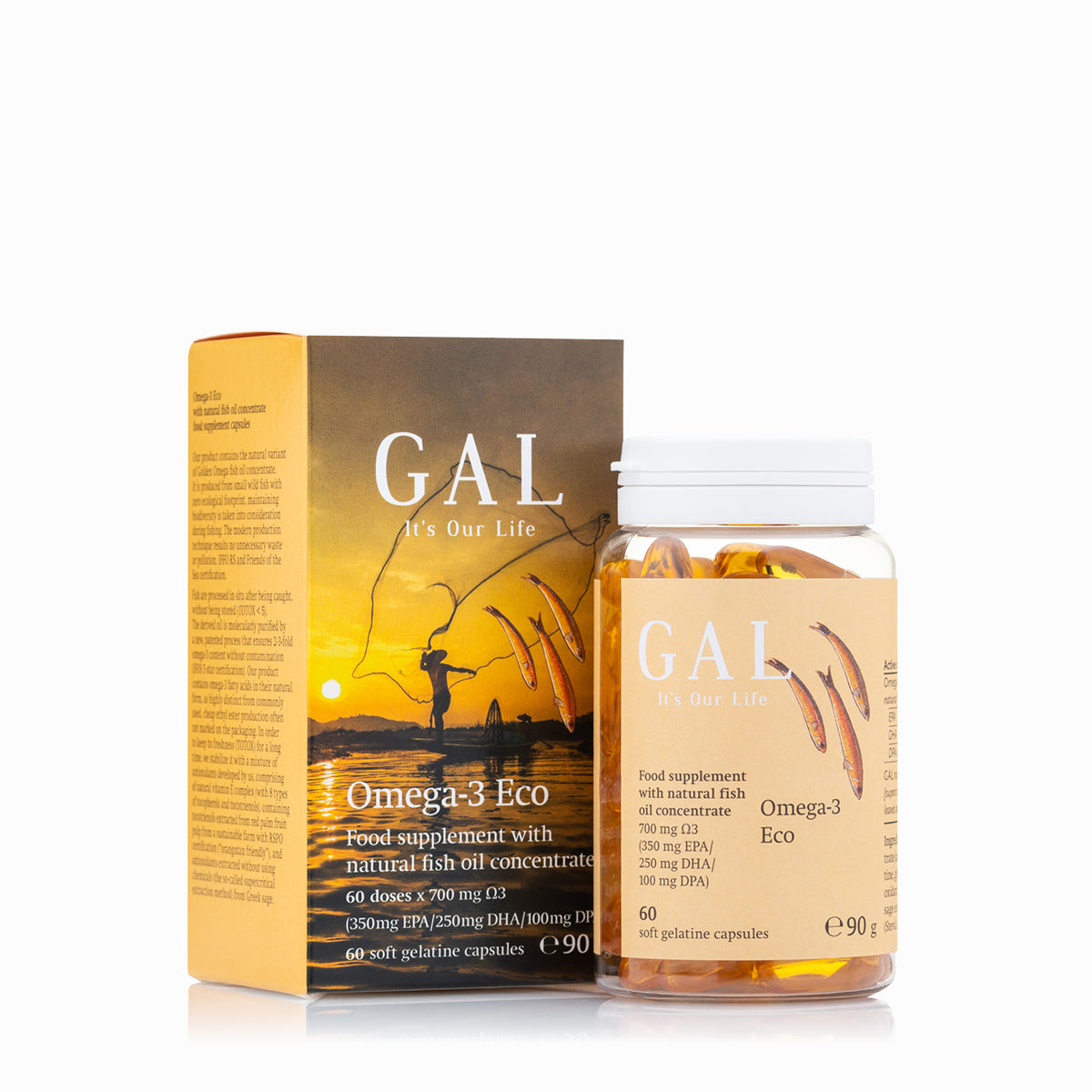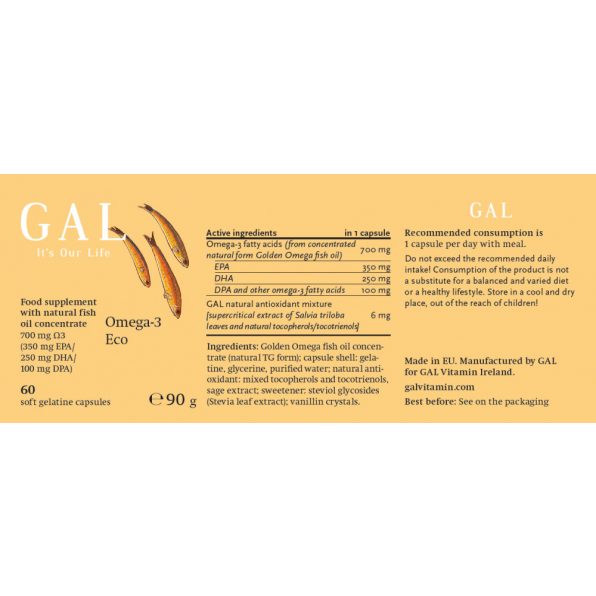Natural Balance Health Center
Omega3 - Fish oil capsule
Omega3 - Fish oil capsule
Couldn't load pickup availability
60 doses x 700 mg Ω3 (350 mg EPA / 250 mg DHA / 100 mg DPA)
Brain and nervous system
- It may decrease depression, aggression, irritability and bad mood
- It might promote learning processes
- It may help brain development, especially in the case of appropriate intake during pregnancy and childhood
- It may improve the cardiovascular system
- It may help maintain the elasticity of blood vessels
- It might regulate cardiac rhythm and the level of cholesterol
- It may decrease the risk of thrombosis, stroke and infarction, just as triglyceride and blood pressure levels
Others
- It could help prevent the developing macular degeneration (AMD) and dry eye syndrome
- It might be beneficial for the capillary vessels of the eye
- Due to its strong anti-inflammatory effect, it might be effective against rheumatic arthritis
- It may help maintain the health and shine of hair and skin
- The telomere that protects the ends of the DNA-strand is shortening more slowly in people with high blood levels of EPA and DHA, which is currently the most accurate marker of life expectancy
Recommended consumption for adults:1 capsule per day with meal.
We selected the natural (triglyceride) form of Golden Omega fish oil concentrate for the production of the Omega-3 Eco, distinguished by the following characteristics:
Eco: Produced from small wild fishes with zero ecological footprints maintaining biodiversity is taken into consideration during fishing; and the modern production technique results in no unnecessary waste or pollution – the product has an IFFO RS and Friends of the Sea certification as well.
Purity: Produced 100% from a small, wild species of anchovies that has a short life-cycle, living mainly on krill and various planktons. Due to this and the pollution-free fishing area, even the extracted raw oil is pure, but this is further purified with a new, gentle and patented method, resulting in a product that does not contain any detectable pollutants, even with the most precise measuring techniques! There is no other fish oil that would be purer.
Freshness: Fishes are processed immediately after being caught, without being stored, thus the TOTOX value is extraordinarily low, below 5. Calculated per unit of active ingredients, this is the world’s freshest fish oil! Extra high level of active content ingredients: GAL Omega-3 ECO contains 700 mg Ω3 fatty acids per soft gelatin capsule, out of which 350 mg is EPA, 250 mg is DHA, while 100 mg is DPA and SDA. (Other fish oil capsules generally contain 100-350 mg Ω3 per capsule.)
Naturalness: Natural triglyceride (TG) form, not a cheap, artificial ethyl ester (EE) form typically included in concentrated fish oils (and usually not marked in the ingredients as it is not obligatory). Apart from the romantic concept of naturalness, this is also important because the appearance of ethyl esters on the market is the reason why many research have recently found that the consumption of fish oil is less beneficial against cardiovascular problems than we have thought... All these research used the unnatural ethyl ester (EE) form! As it is usually unmarked, the only way to make sure that the chosen product contains TG or EE is to test it on polystyrene: EE starts to dissolve it within seconds, while TG does not! 30% better absorption: The absorption of Ω3 fatty acids is 30% better from molecularly purified and concentrated fish oils that nevertheless keep their natural TG form compared to untreated natural fish oils (not to even mention the EE form).
The famous and strict Canadian body certifying fish oil products, the IFOS, have evaluated it as a 5-star product, and it has by far exceeded the requirements of this level as well. In order to keep its freshness (TOTOX) for a long time, we stabilized it with a mixture of antioxidants developed by us, comprising the natural vitamin E complex (with 8 types of tocopherol and tocotrienols), containing tocotrienols extracted from red palm fruit pulp from a sustainable farm with RSPO certification (“orangutan friendly”), and antioxidants extracted without using chemicals (the so-called supercritical extraction method) from Greek sage.
Taking 1 capsule daily from our product is sufficient to achieve all the possible positive effects of omega 3 fatty acids on the brain, eyes and the cardiovascular system, as this requires a minimum of 500 mg EPA+DHA. Up to 2-6 average fish oil capsules would be required for this (no matter that their recommended dosage is also 1 capsule per day). However, to reduce the level of triglycerides a minimum of 2000 mg EPA+DHA is required according to the EFSA, thus 3-4 capsules are needed for this purpose (but not 8-20 capsules as in the case of most fish oil capsules).
About Omega-3 The ratio of Omega-3 and omega-6 fatty acids is essential for the appropriate functioning of our body, as each cell in the body produces anti-inflammatory hormone-like substances from the omega-3 fatty acids EPA and DHA, while the excess consumption of a certain omega-6 fatty acid (arachidonic acid) results in the production of pro-inflammatory substances. The majority of the most common diseases (lifestyle diseases) develop due to high levels of overall inflammation, just as ageing is accelerated by the elevated levels of inflammation. The human body is genetically “designed” for a ratio of around 1:1 of omega-3/6 fatty acids. The fatty acid ratio in the bodies of our ancestors was close to 1:1, as it is still in some recent, very healthy ethnical groups. Unfortunately, the current low consumption of saltwater fishes and other seafood, in addition to the excess consumption of vegetable oils and fats of fed animals, both with high omega-6 fatty acid levels, this ratio has shifted significantly towards omega-6 (1:8 - 1:32). This shift is the cause of many diseases.
In order to restore this ratio, the best is to decrease the consumption of food rich in omega-6 considerably, to take pure dietary supplements containing EPA and DHA regularly, and to eat saltwater fished and other seafood multiple times a week. Vegetable oils with omega-3 content are not appropriate, except for algae oils, as they contain alpha linoleic acid (ALA) instead of EPA and DHA as omega- 3 fatty acids, which is not or only hardly transformed to the useful EPA and DHA fatty acids in the human body.
Omega-3 of animal and algae origin are the most useful for the human body. The omega-3 of plant origin (ALA), apart from its restricted ability to be transformed to the useful EPA and DHA forms, also decreases the production of dihomo-gamma-linoleic acid in our body – a beneficial fatty acid with anti-inflammatory properties. The production of this important fatty acid is also decreased by the excess consumption of omega-6 fatty acids, thus it is extremely important not to compensate our high omega-6 fatty acid intake by consuming omega-3 sources of plant origin, as both of these will cut down the level of this important anti-inflammatory fatty acid in our body. While on the contrary,
EPA and DHA do not decrease it, indeed... It is impossible to list all the beneficial effects of consuming fish oil, that is, of a proper omega-3 ratio and the high level of EPA, DPA and DHA fatty acid intakes.
Made in the EU
Warnings
KEEP OUT OF REACH OF CHILDREN. DO NOT EXCEED RECOMMENDED DOSE.
If you are undergoing treatment for a medical condition or if you are pregnant or lactating, please consult your medical practitioner before introducing supplementary foods to your normal routine. The dietary supplement should not be used as a substitute for a varied and balanced diet or a healthy lifestyle. Store tightly closed in a cool and dry place.
References:
1. Examine.com
2. Liou et al.: Decreasing Linoleic Acid with Constant α-Linolenic Acid in Dietary Fats Increases (n-3) Eicosapentaenoic Acid in Plasma
Phospholipids in Healthy Men. J Nutr. 2007 Apr;137(4):945-52.
3. Liou et al.: Dietary linoleic acid has no effect on arachidonic acid, but increases n-6 eicosadienoic acid, and lowers dihomo-gamma- linolenic
and eicosapentaenoic acid in plasma of adult men. Epub 2009 Apr 8.
4. Wang et al. n-3 Fatty acids from fish or fish-oil supplements, but not alpha-linolenic acid, benefit cardiovascular disease outcomes in primaryand
secondary-prevention studies: a systematic review. AJCN 2006 Jul;84(1):5-17.
5. Schwab et al.: Effects of hempseed and flaxseed oils on the profile of serum lipids, serum total and lipoprotein lipid concentrations and
haemostatic factors. Eur J Nutr. 2006 Dec;45(8):470-7. Epub 2006 Nov 10.
Share




